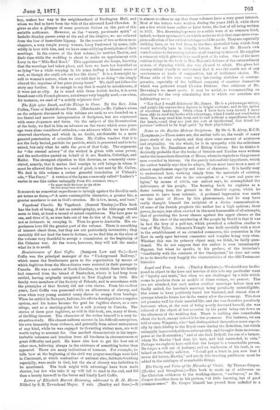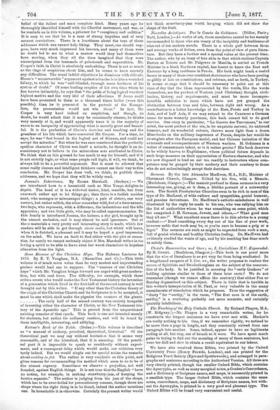The Verity and Value of the Miracles of Christ. By
Thomas Cooper. (Hodder and Stoughton.)—This book is made up of addresses on the Christian evidences to the working-classes, "audiences," as Mr. Cooper describes them in his preface, "of little learning, but of good common-sense." Mr. Cooper himself has passed from unbelief to a belief of the fullest and most complete kind. Many years ago he thoroughly identified himself with the Chartist movement, and was, as he reminds us in this volume, a prisoner for " conspiracy and sedition." It is easy to see that he is a man of strong impulses and of very earnest convictions. There is a heartiness about the tone of these addresses which one cannot help liking. They must, one should sup- pose, have very much impressed his hearers, and many of them were no doubt led to see in what a narrow world they had themselves been moving, when they all the time imagined that they were emancipated from the trammels of priestcraft and superstition. Mr. Cooper's faith in Christ is absolutely undoubting. There is not so much as the tinge of scepticism about him, and he seems to have scarcely any difficulties. The usual infidel objections be dismisses with ridicule. Hume's " unanswerable " argument against miracles is to him a wretched fallacy, to which he was " self-blinded, through mere fondness of his system of doubt." Of some leading sceptics of his own time whom he has known intimately, be says that "the pride of being logical was their highest motive and the very idol of their affections. If Jesus could have been presented to them as a thousand times holier (were this possible) than he is presented in the portrait of the Evange- lists, the presentation would not win them." In fact, Mr. Cooper is very hard indeed on scepticism, and though, no doubt, he would admit that it may be occasionally sincere, he thinks very meanly of it, and would apparently trace it in the majority of oases to an incapacity of appreciating what is morally great and beauti- ful. It is the perfection of Christ's doctrine and teaching and the grandeur of his life which have converted Mr. Cooper. For a time, he says, he was "fast bound in the logical net of Strauss, and could not accept the miracles." But when he was once convinced that the perfectly spotless character of Christ was itself a miracle, he thought it an in- consistency not to believe in the miraculous acts attributed to Christ. We think that on this ground he has much to say for himself, and if it is not strictly logic, or what some people call logic, it will, we think, be always felt to be a powerful argument- But it must be allowed that some really sincere and intelligent thinkers cannot see their way to this conclusion. Mr. Cooper has done well, we think, to publish these addresses, and we hope that they will be widely read.



































 Previous page
Previous page